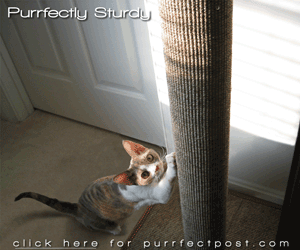Inhalant Allergies in Cats

Cats can get itchy skin for a variety of reasons. The most common of these are flea allergies, food allergies, and inhalant allergies. Inhalant allergies in cats are also called atopy, and the resultant skin issues can be called atopic dermatitis.
What Are Inhalant Allergies in Cats?
When a cat inhales something and her body's immune system mounts an attack to get rid of it, there's a chance for an over-reaction to occur. That's an allergy, and it causes negative signs in the cat, usually extremely itchy skin.
Cats can be allergic to any substance they breathe in, but the most common inhalant allergies are to molds, spores, pollens, and dust.
Signs of Feline Inhalant Allergies
Cats with inhalant allergies experience itchy skin, and usually, it's relatively generalized over the whole body. The cat displays this itchiness by licking incessantly and scratching aggressively. As a result, you might see the following:
- Bald spots on the cat
- Raised red bumps on the skin
- Inflammation
- Rodent ulcer*
*Rodent ulcer has nothing to do with mice or rats. It's a common name for a condition in which a cat's mouth and lips become swollen, excoriated, and infected, and it's secondary to an inhalant, flea, or food allergy.
Cats with inhalant allergies may vomit more hairballs than usual because they ingest extra fur while over-grooming.
Diagnosis of Inhalant Allergies in Cats
When you see your cat scratching at or licking her skin more than is typical for her grooming routine, take her to the veterinarian. The doctor will take a thorough history from you and do a complete physical exam. He or she may run some tests such as skin cytology, skin scraping, skin culture and sensitivity.
If there is a secondary skin infection, the doctor will treat that. He or she may also give steroids or antihistamines to calm the itch, whatever its cause.
It's possible that your veterinarian will begin by ruling other causes of scratching out. For instance, flea preventative might be prescribed to make sure a flea allergy isn't the cause of the issue. Symptomatic care can be begun, and then if the signs return, more information will be available to continue diagnostics.
Skin testing is the gold standard for testing for inhalant allergies in cats. This is usually done by a veterinary dermatologist, and it involves injecting tiny amounts of various allergens into the skin and seeing which ones the cat reacts to.
Blood tests are available for inhalant allergies in cats, but most veterinarians do not consider them to be as reliable as skin testing.
Treatment of Feline Inhalant Allergies
The only true remedy for inhalant allergies in cats is desensitization injections, but it doesn't help every cat. Once it's determined through skin testing what the kitty is allergic to, a serum is made up that contains tiny amounts of those substances. The owner learns to give injections, and a specific timing and dosing schedule is followed. These injections teach the cat's immune system not to over-react to the allergens, and over time, the cat's skin problem resolves.
Desensitization treatment works incredibly well for some cats but not as well for others.
Cats that have allergies often have multiple things they're allergic to, so a cat with inhalant allergies may also benefit from a food trial to determine whether an allergy to components of the diet are exacerbating the situation. They should also be kept on full-time flea preventative so flea allergy dermatitis doesn't complicate things.
For many cats, treatment of inhalant allergies is an ongoing thing, with avoidance, desensitization, and symptomatic treatment all playing a role in keeping the kitty comfortable.
You May Also Like These Articles:
Flea Allergy Dermatitis in Cats
Why Do Some Cats Dip Their Paws in the Water Bowl?
Notice: Ask-a-Vet is an affiliated service for those who wish to speak with a veterinary professional about their pet's specific condition. Initially, a bot will ask questions to determine the general nature of your concern. Then, you will be transferred to a human. There is a charge for the service if you choose to connect to a veterinarian. Ask-a-Vet is not manned by the staff or owners of CatHealth.com, and the advice given should not delay or replace a visit to your veterinarian.





